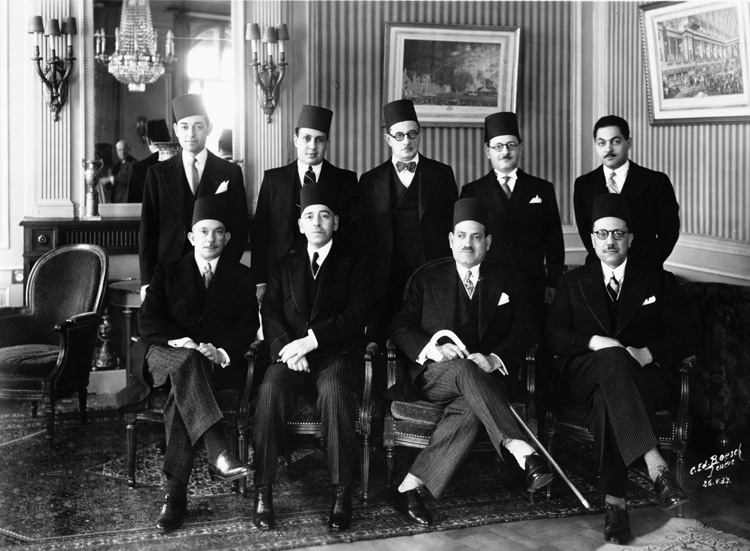The Egypt that Was
The Egypt that Was

Rami Mangoubi, Ph.D.

A photo representing the kaleidoscope that was Egypt in May 1937; the bipartisan multi-ethnic Egyptian delegation to the League of Nations pauses for a photo-op at Geneva's Hotel des Bergues: Seated from L-R: Ali Chamsi Pasha (Muslim), Foreign Minister Wassef Ghali Pasha (Copt), Prime Minister Mustafa Nahas Pasha (Muslim) and Wafd Party elder William Makram-Ebeid Pasha (Copt). Photo From http://www.indiana.edu/~league/photocategories.htm
"That was Egypt’s 1936 multi-ethnic Egyptian delegation”, … and the key word is : was.
Images of the Egypt that was genuinely point to a cosmopolitan and diverse culture, now long gone. But a more thorough knowledge of history reveals that these images also belie a sad truth: Even in this Belle Epoque, ninety percent of Jews were denied citizenship regardless of how many generations they lived in the country. More than half were stateless: No citizenship. With time, no citizenship led to loss of livelihood[i].
And in the Egypt that was, blood libels were not unknown…Blood libels occurred in Cairo (1844, 1890, 1901-02), in Alexandria (1870, 1882), Port Said (1903, 1908), and even in cities with a smaller Jewish population, like Mansura and Damanhur [ii].
Prejudice against Jews was alive and well long before Israel and Zionism; No point excusing anti-Semitism in Egypt with talk of Israel and Zionism as root causes.
While they were and still are cherished by many Muslim friends in Egypt rich and poor, two ethno-centric, racist and anti-Semitic groups resented Jews and other minorities: the fundamentalist Brotherhood (Al Ikhwan), and the nationalist pan Arabists. While the two movements to this day are ardent enemies of each other, their animus towards Jews and Israel was limitless.
The result is today's Egypt: A society ethnically cleansed of Jews, … a society where anti-semitic stereotyping of Jews and Holocaust denial are very respectable[iii].
Indeed, it was an Egypt whose modern infrastructure and culture was the envy of Africa and Asia, if not Europe too. This, thanks in most part to the Jewish community that introduced the textile and sugar industry during World War I, built from scratch the retail sector, the modern banking and financial systems[iv], a Jewish community that contributed to Egyptian culture way beyond its size and gave Egypt Togo Mizrahi, Laila Murad, Da'ud Husni, Murad Farag, Nagua Salem[v], and many others, only to be rewarded with massacres, to see its property confiscated, and its sons incarcerated and tortured for years in Abu Za'abal and Tura, before being deported out of the country[vi]. We are thankful to countries like Israel, America, and Canada; they welcomed us with open arms, and made it possible for us to rebuild our lives.
But wherever we are, we never forget that in the Egypt that was, Jews had and still have Muslim and Christian friends whom they loved and for whose love they are grateful; the friends protected Jews whenever they could, and cried as they saw them deported to prison or out of the county.
Alas, little could these friends do to keep bigotry from prevailing, and ethnic cleansing from taking place. But they and we tell our children: If only Jews and their non-Jewish friends were heard in Egypt, there would have been no massacres of Egyptian Jews[vii] nor Invasion of Israel in 1948, and no war thereafter, and Israel the Jewish state and Egypt the largest state in the region together would have turned the Near East into the Oasis of humanity’s dreams.
Rami Mangoubi, Ph.D.
[i] Shimon Shamir, ed., “The Evolution of Egyptian Nationality Laws and their application to the Jews in the monarchy period,” in Shimon Shamir, the Jews of Egypt, A Mediterranean Society in Modern Times, Boulder: Westview Press, 1987, pp. 33-67.
[ii] Bernard Lewis, The Jews of Islam, Princeton University Press, Princeton, New Jersey, 1981, p. 158. See also El Kodsi, The Karaite Jews of Egypt,Willprint, Pp. 256-257.
[iii] Two examples: “Leader of Egypt’s Moslem Brotherhood calls Holocaust a myth”, New York Times, Dec. 22, 2005. Article found on http://www.hsje.org/ldrislmstcallsholocaust.htm , William Fisher, “Why should We Be Surprised?,” www.billfisher.blogspot.com , posted on January 18, 2006. The site www.memritv.org is an excellent window on the Arabic speaking media.
[iv] Maurice Mizrahi, "The role of Jews in Economic Development", Ch. 6 in Shamir, Pp.86-87, and Maurice Mizrahi, L'Egypte et ses Juifs, le Temps Révolu, Lausanne, 1977.
[v] For Murad Farag, see Sasson Somekh, "Participation of Egyptian Jews in Modern Arabic Culture and the case of Murad Faraj", in Shimon Shamir, Ch.9, and Murad el Kodsi, The Karaite Jews of Egypt, Willprint 1987, Pp. 244-257. For Da’ud Husni, see Murad el Kodsi, The Karaite Jews of Egypt, Pp. 258-266, and
http://www.hsje.org/comdaoudhosn_arabic.htm.
For Togo Mizrahi, see http://www.zoominfocus.com/egyfilm/pioneers/togom.htm
[vi] Michael Laskier, The Jews of Egypt, New York University Press, 1992, Ch. 5-8. See also Marc Khedr, My Life in Abu Za’abal and Tura, http://www.hsje.org/mylife.htm
[vii] One massacre took place on the Jewish Holiday of Shavuot (New York Times, June 21, 1948, and New York Times), another one near the High Holidays. Laskier, Ch. 5-6 provide details.
